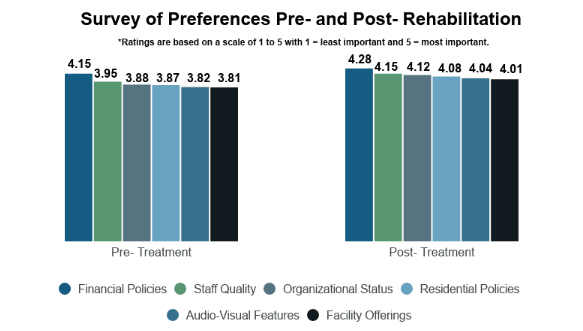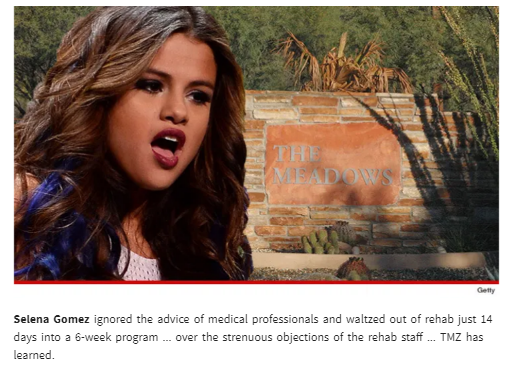Based on my in-depth understanding of rehab, I believe leaving inpatient rehab is possible, but it’s not an appreciative idea.
I know this from years of experience. Rehab was challenging yet rewarding. Inpatient rehab covers detox, coping skills, addressing concerns, and preparing you for sobriety.
Even research shows how your perspective changes toward your living factors after rehab.

Source: NCDAS
But many are afraid to face the facts. Even in some cases, I noticed addicts are afraid of revealing any secret and choose to leave inpatient rehab.
Know the ins and outs of leaving rehab here.
Understanding Leave Inpatient Rehab Against Medical Advice (AMA)
It means you stop treatment without medical advice. That may be due to boredom, frustration, homesickness, or outside pressure.
Leaving inpatient rehab, AMA can harm your health and rehabilitation.
- You may relapse after leaving because you don’t know how to handle cues and urges.
- Your decision may hurt and betray your family and friends.
- You may lose your job, insurance, or custody rights.
Leaving inpatient rehab AMA may worsen your predicament. 25% of inpatient rehab patients leave AMA, according to NIDA.
Inpatient rehab is the most intensive and effective addiction treatment. Thus, that’s a high percentage.
A report shared in 2014 by TMZ mentioned Selena Gomez went to Meadows rehab on the first of 2014 for a 6-week treatment. But she left the rehab AMA within 2 weeks.
Even the rehab mentioned then that it was harmful not to take proper treatment on time. Source: TMZ


But later, Selena mentioned it was her Lupus for which she left the rehab.
Factors Influencing the Decision to Leave Rehab Early: Exploring the Reasons
Rehabilitation is necessary but challenging. Reasons people leave rehab early one may want to are below-
Treatment Aversion: Mismatching
As an experience for years, I noticed people leave treatment early for lack of motivation or preparedness to treat.
Forced recuperation by family, friends, or the state may not be wanted. They may be bitter, defiant, or sad. Recovery demands willpower. It’s hard to follow the rules, complete treatment, and handle rehab as an addict.
Overall, the situation or circumstances may not go with the rehab for the individual.
Withdrawal Feelings
Emotional difficulties during detox and withdrawal may contribute to early discharge from treatment.
The substance, duration, and intensity of detoxification can cause nausea, vomiting, sweating, tremors, anxiety, sadness, irritability, sleeplessness, and cravings.
These symptoms might cause grief, rage, and discontent with the healing process. You may want to leave inpatient rehab and use it again to avoid the misery.
According to SAMHSA, 90% of drug users don’t get treatment. 17% of rehab participants leave unsupervised. Prematurely leaving rehab can harm our health, relationships, and future. It typically happens within the first two weeks.
Dealing with Rehab Environment
In my practice, I’ve observed rehab adjustment problems. Rehab may present obstacles. Rehabs provide safety, structure, and resources but require lifestyle changes.
These changes may include sharing a room, following a timetable, or having limited access to personal goods and external communication. You may also suffer with location, temperature, amenities, or making friends in recovery.
Most of the time, these make one leave the rehab as soon as possible. It mostly happens within the first days of rehab.
Navigating Treatment Challenges and Decision-Making
In an inpatient rehab program, you may face some challenges and dilemmas. Such as-
- You may wonder if you can leave whenever you want or must stay until the end.
- You may feel frustrated, bored, or hopeless at times.
- You may question whether the treatment works for you or needs a different approach.
The Importance of Open Communication with Treatment Providers
Your therapy team supports you and helps you heal. And can address your concerns and change the treatment strategy.
Successful treatment requires communication. Being honest with treatment providers builds trust and helps overcome challenges. Luckily, you can voice your preferences and participate in recuperation.
Talk to your doctors. They can solve your problems and meet your needs.
Build relationships with your providers. They can help you set reasonable rehabilitation objectives and track your progress.
They won’t judge you or make you do anything you don’t want to. They may help you recover and flourish.
What to Do if You are Considering Leaving Rehab Early
In and out of rehab early is frequent, but it might harm your health. GoodTherapy found that 3% to 51% of mental health patients depart against doctor recommendations, averaging 17%.
Leaving despite medical advice increases mortality and healthcare expenses.
Consult your treatment team beforehand. They can help you assess the risks and benefits of leaving rehab early.
Talk to loved ones. They can comfort and advise you. However, don’t allow them to negatively impact your decision.
Seeking Alternative Treatments before Leave Inpatient Rehab
These alternatives are not for everyone. Some need more extensive and structured care than they can provide. Home may also present more obstacles or stressors than treatment.
Join a support group or outpatient program. These alternatives offer treatment, education, medicine, peer support, and accountability, like inpatient rehab. That may be helpful to quit addiction.
Consult your treatment team before switching treatments. They can assess your readiness for these possibilities and provide resources.
Outside of rehab, you have alternative treatment options. 90% of drug addicts don’t get treatment, according to American Addiction Centers. Outpatient treatments and support groups have helped many people overcome addiction.
People Also Asked
Can You sign Yourself out of a Rehab Facility?
Yes, you can. However, it is not recommended. Leaving rehab too soon can be bad for your health.
There may be relapses, court problems, and help from family. Rehab is a safe place to recover from addiction and learn new ways to deal with it. Stay until your treatment plan is done.
Can a Rehab Kick You Out?
Yes, they can. But they don’t do it lightly. If you use drugs or alcohol, are violent or disruptive, or refuse treatment, a rehab may expel you.
They may kick you out if you don’t pay your bills or lose your insurance. Before expulsion, a rehab will aim to assist you in conquering your issues. They want you to overcome addiction.
Before you decide to leave inpatient rehab, take a moment to think carefully about what could happen. Leaving too soon can hurt your health, relationships, and future chances. Think about how far you’ve come, ask your treatment team and loved ones for help, and remember that staying in rehab gives you the best chance of getting better for good.
- What to Pack for 30-Day Rehab? FREE Checklist - May 30, 2024
- Types of Outpatient Rehab: Difference One Should Know - March 28, 2024
- Truth Behind FMLA: Hidden Hurdles of Alcohol Rehab Leave - March 28, 2024